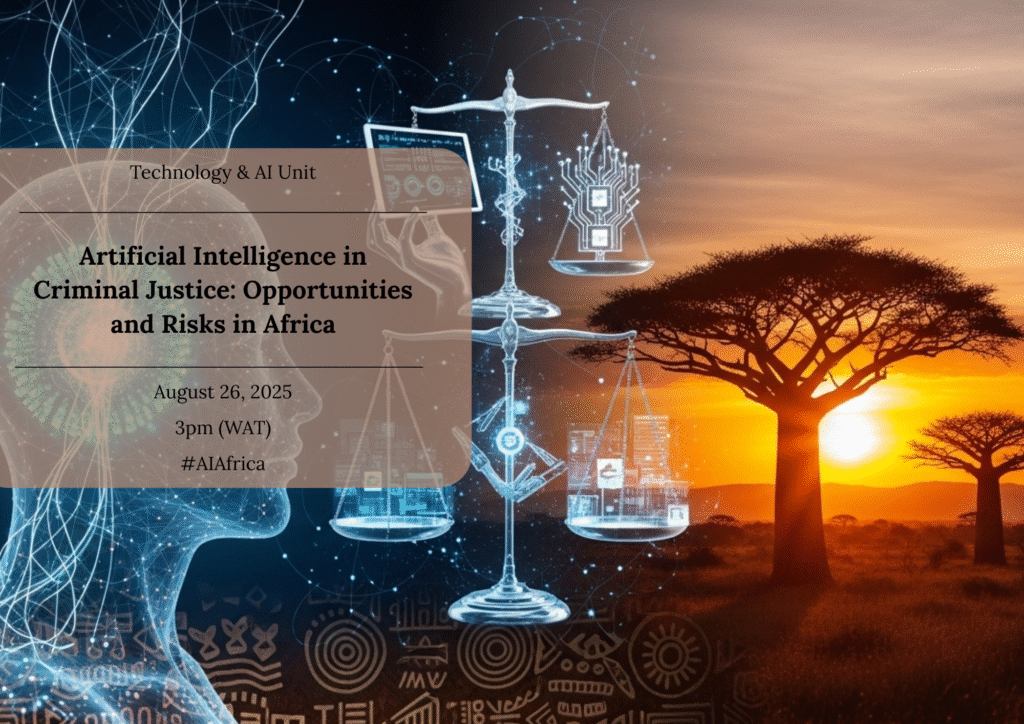The Firdaous Initiative for Academic Excellence cordially invites you to a thought-provoking webinar on the theme: “Artificial Intelligence in Criminal Justice: Opportunities and Risks in Africa.” As artificial intelligence continues to reshape industries and societies globally, its integration into the African criminal justice landscape presents a dual-faced reality of profound opportunities and significant ethical challenges. This webinar will convene distinguished experts to dissect the complexities of AI’s role in law enforcement, judicial processes, and legal frameworks across the continent. We aim to foster a critical dialogue among academics, policymakers, legal practitioners, and civil society on navigating this new frontier to ensure that the pursuit of justice is enhanced, not encumbered, by technological innovation.
Event Details
Date: Tuesday, August 26, 2025
Time: 3:00–4:30 PM WAT
Format: Google Meet
Background
The advent of Artificial Intelligence has ushered in a paradigm shift in the administration of justice worldwide. In Africa, where legal systems often grapple with resource constraints, case backlogs, and complex criminal activities, AI presents a compelling proposition for transformative change. Technologies such as predictive policing algorithms, data-driven sentencing tools, and advanced forensic analysis offer the potential to increase the efficiency and effectiveness of law enforcement agencies. These innovations could lead to faster investigations, more objective decision-making, and a more streamlined judicial process, ultimately strengthening the rule of law and enhancing public safety.
The opportunities presented by AI are vast and varied. For instance, AI-powered systems can analyze immense datasets to identify crime patterns and hotspots, enabling more strategic and proactive policing. In the courtroom, AI can assist legal professionals with case law research and evidence management, reducing human error and expediting trials. Furthermore, biometric identification and surveillance technologies can be instrumental in tracking and apprehending criminals, particularly in cases of cross-border crime and terrorism. The proper application of these tools could significantly bolster the capacity of African nations to deliver justice swiftly and effectively to their citizens.
However, the deployment of AI in criminal justice is fraught with significant risks that demand careful consideration. One of the most pressing concerns is the potential for algorithmic bias. AI systems learn from historical data, which may reflect and perpetuate existing societal biases against marginalized communities. If unchecked, these technologies could amplify discrimination in policing, bail, and sentencing decisions, further entrenching systemic inequalities. The “black box” nature of some complex algorithms, where the reasoning behind a decision is not transparent, poses a fundamental challenge to the principles of due process and the right to a fair hearing.
Beyond bias, the use of AI in law enforcement raises profound questions about surveillance, privacy, and fundamental human rights. The proliferation of facial recognition technology and mass data collection can lead to a pervasive surveillance state, eroding individual liberties and creating a chilling effect on freedom of expression and association. Without robust legal and ethical frameworks, there is a tangible danger that these powerful tools could be misused for political repression or to target vulnerable populations, undermining the very principles of justice they are intended to serve.
Therefore, as African nations stand on the cusp of this technological revolution, a proactive and human-rights-centered approach is imperative. It is crucial to develop comprehensive governance structures, ethical guidelines, and transparent accountability mechanisms to steer the development and deployment of AI in the justice sector. This requires a multi-stakeholder collaboration involving governments, the judiciary, academia, the tech industry, and civil society to ensure that the integration of AI is guided by principles of fairness, equity, and respect for human dignity, thereby harnessing its potential for good while mitigating its inherent risks.
Objectives of the Webinar
- To analyze the transformative opportunities that AI presents for enhancing the efficiency, effectiveness, and fairness of criminal justice systems across Africa.
- To critically evaluate the ethical risks, including algorithmic bias, surveillance, and human rights implications, associated with the use of AI in law enforcement and judicial processes.
- To explore the development of robust governance frameworks and international standards necessary to ensure the responsible and ethical deployment of AI in the African context.
- To facilitate a multi-stakeholder dialogue on balancing technological innovation with the protection of fundamental human rights in the pursuit of justice reform.
Distinguished Speakers
- Dr. Nyambi Nfor
Assistant Professor, Faculty of Shariah and Law, Villa College, Maldives
Topic: Governing AI in Criminal Justice: International Standards and Ethical Safeguards for Africa. - Prof. Tajudeen Sanni LLD/PhD
Head, Centre for Transformative Environmental and Marine Law, Faculty of Shariah and Law, Villa College-Maldives
Topic: AI-driven forensics and evidence management for environmental crime. - Mr. Daniel Duom
Topic: Artificial Intelligence and Criminal Justice Reform in Africa: Balancing Innovation and Human Rights.
For more information, please contact
Abdullahi Shafii
Head AI & Technology Unit
Firdaous Initiative for Academic Excellence
shafii@firdaouscentre.org


This training will have positive impact on young learners the given an IA and the Advance technology Revolution of the 21th century.
willing to learn on the Topic
I am excited to participate in the webinar as a law student from Starford International University.
my name is Nadar Ahmed and I am student University at Faculty of Law I want to prepare that seminar thnkz